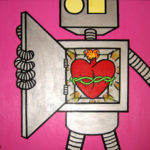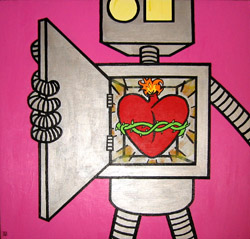Speculative Love: An Introduction
 No, this is not a manual for exobiological reproduction, alien mating rituals, or human-vampire hybridization. My apologies if that is what you expected when you arrived here. Given that the name of this blog is Speculative Faith, on which topic we spend a great deal of electronic ink, and Becky Miller just did a piece on hope in speculative fiction, I thought it might be a good time to launch into a series on love, and how it’s handled, or mishandled, in spec fic, Christian or otherwise, and how that might move us to action as readers and writers within the genre.
No, this is not a manual for exobiological reproduction, alien mating rituals, or human-vampire hybridization. My apologies if that is what you expected when you arrived here. Given that the name of this blog is Speculative Faith, on which topic we spend a great deal of electronic ink, and Becky Miller just did a piece on hope in speculative fiction, I thought it might be a good time to launch into a series on love, and how it’s handled, or mishandled, in spec fic, Christian or otherwise, and how that might move us to action as readers and writers within the genre.
There don’t seem to be many speculative fiction stories where love is at the center. It’s usually a bit player, positioned somewhere toward the back of the stage, next to the shrubbery. A romantic interest thrown in for spice, one of many motivations for the hero or heroine, maybe even part of an intellectual sidebar discussion about those alien mating rituals some of our wandering googlers may have expected today. Something to bide the time between swordfights or starship battles. I found a couple of forum discussions at Asimov’s and io9 about science fiction love stories, and there was a lot of head-scratching and shoulder-shrugging. Stuff along the lines of, “I know I’ve read one, somewhere, but it’s just not coming to mind right now.” It was interesting how much variety was on display in the stories that were suggested, and many were not romantic or otherwise “love stories” in the conventional sense at all. Examples came more easily from movies than books.
This is a topic that tends to multiply rabbit trails with a fecundity rivaled only by the little hippity-hopping cottontails themselves, so I’ll do my best to keep this focused. Here’s a quick FAQ:
1. How long is this going to take? I don’t know yet. We tend to do these things in threes around here, so maybe three installments, not counting this one, each with a different perspective on the issue. Maybe longer, if people seem interested. If you’ve got some ideas about how you’d like to see this particular elephant portioned out, please speak up.
2. Haven’t we done this already? I expect there are previous posts in the archive on this topic. I don’t care…no, I do care, but I expect they’ve followed different rabbit trails than I will. I may refer to them.
3. You do realize there’s more than one kind of love? Yes, that’s part of the point of this. I don’t intend to give the eros – storge – philia – agape talk, but I’m sure we’ll touch on all of those as we go along.
4. Science fiction or fantasy? Yes. We can talk about horror, too, though it might be harder to find positive examples there.
5. There’s not going to be a lot of mushy hugging and kissing stuff, is there? Well, it’s bound to come up. Cover your eyes if you must.
Next week, Part 1.








































STUPID excited about this series. I’m currently wading through my own thoughts on this stuff. With a trilogy that is being marketed as a “supernatural romantic trilogy” for young adults, this is a topic never far from my mind.
CANNOT WAIT! You’ve inherited a new stalker, Fred. 🙂
I agree — I think this will be an interesting series. Of course you realize in the general market there’s a whole genre devoted to speculative love stories: paranormal romance. In thinking about Christian speculative fiction, however, I could only come up with a couple authors that incorporate romance in their stories.
Interestingly, romance is the thing I thought both Lewis and Tolkien needed in their stories. Yes, Tolkien had a “love interest” but I would hardly call what he showed “romance.” Anyway, I thought it necessary to make romance a key component in my stories. Hence my interest in where you’ll take this discussion, Fred.
Becky
Wait. “Storge”??? They never taught me that one…~exits to look it up~
Shannon: Thanks…I think. I’ll try not to disappoint.
Becky: Romance is something I want to talk about, as it’s such a big part of how we form our expectations regarding love that it becomes easy to confuse romance with love itself. Also, from a storytelling perspective, love minus romance is often inspiring and noble, but not compelling. There are, of course, exceptions.
As for Tolkien, you might investigate the tale of Beren and Luthien, found in The Silmarillion. *There’s* a romance told in a grand, mythic style–evidence to me that he could pull it off when he wanted to.
This could be interesting.
A non-romantic love I recall is Ender’s love for his sister. That love played a major role in Ender’s Game.
Romance in the speculative realm does seem more common in movies than books, even stories that started out as books (there was no romance between Susan and Caspian in the book). I’m not very fond of romance. Maybe because it seems all about superficial games over fleeting emotions with way too much drama. The little romance that has been included in some of my reading seems very lacking in commitment- just like in our culture.
I believe there is much in American culture that is only selfish desire and manipulation masquerading as “love”. Too many seem to not know what true love looks like. I’d hope that if more stories contained examples of love lived out- full and healthy, then more people would desire the real thing and turn away from the artificial. I want to see: Real parental love, not the parent trying very hard to be liked as their child’s friend; Real married love, not the artificial ‘happily ever after’, but love that has to work and fight to make it last; Real… dare I say it… “teen love”, where they are actually concerned about the quality of person and not just physical appearance and sexual desire.
I believe Christians should have a lot to say about love, and that it should play a more central role in our stories. Don’t call it “romance” though, because you’ll turn my stomach with the nauseating images that word invokes for me.
I second Patrick! I’d love to know how to write, well, love. And what the real thing looks like.
The only love story in science fiction that I know of is The Yargo by Jacqueline Susan. (Of course, I read it while doped up on meds post wisdom teeth removal, so it might not have been as entertaining as I thought it was.) But I haven’t read very widely in science fiction, aside from a bit of dabbling in the big names like Heinlein, Bradbury and a touch of Asimov.
My favorite fictional love story is the one in the Mitford books. Father Tim and Cynthia’s courtship and problems are so realistic. And hilarious. And heartwarming. I always go back to their romance (and their relationship once they’re married!) as an example of the best romance I’ve ever read. Both parties are very realistic and their romance is woven in and out of other plot threads, so it doesn’t take center stage. (Kind of like real life!)
As opposed to Twilight. Are we allowed to beat the Twilight horse now that the Harry Potter horse is dead?
I could hug you, just for that one.
I’m excited for this one too! The worst memory or experience I ever had with writing came when I just stopped, a third of the way into a story that would have been very, very good because I just couldn’t write it.
It involved a Krionrian (one of my alien races) named Fellclaw who thought that he had lost his wife in one of the climactic battles of his universe. In fact, she’d become a captive and been forced into slavery by pirates. The story was about rescuing her. It was wonderful…. until I realized I just couldn’t write the meeting of long-seperated spouses well enough to to merit writing about it at all. It hurt, and it’s dogged my every step as a writer sense- Is this how this experience really is? Am I writing this well enough to justify me even trying to write it?
Aww, you should have at least tried to write it. Did you ever finish the story?
If you need reference, just watch some chick flicks where similar things happen. Anything with Tom Hanks and Meg Ryan, lol. You can at least fake it and rewrite it later!
Try “Sweet Home Alabama,” which is about a couple separated for years until she comes back. Book three of Lawhead’s “Song of Albion” trilogy (though I suggest you read all three) also covers the subject. As does the “Legends of the Guardian-King” series by Karen Hancock. Either book four or five of Donita Paul’s “DragonSpell” books would also be a good place to go (I think it’s DragonLight, the fifth one). There’s also a similar situation in Eric Wilson’s Jerusalem’s Undead series. Robert Lilparulo’s DreamHouse Kings series would be good, too. (His Deadfall book might help; I’m not sure. You’d get a feel for the type of relationship, at least, I think.)
You learn by imitation. I happen to think your scenario sounds wonderful, so if experience is all holding you back, I’ll gladly throw some books your way.
Speaking of books, I, Jedi, by Michael Stackpole, pretty much centers on the same thing (his wife is kidnapped and he has to train as a Jedi before he can go rescue her). Of course, you kind of have to like Star Wars, but it’s a fantastic read.
@Kessi- Thanks. 🙂 I didn’t feel right, trying to fake it. I never have, trying to write about something I haven’t experienced or can at least imagine from what I do know.
I’ve read several of the books you mentioned in the time between then and now. I may go back and try again- who knows? I probably could pull it off now, but I’m afraid of it like I am of bees and such. When you get stung and it’s bad, history kind of broods and your reluctant to go back to where you got stung, or in this case, to that rose of a story.